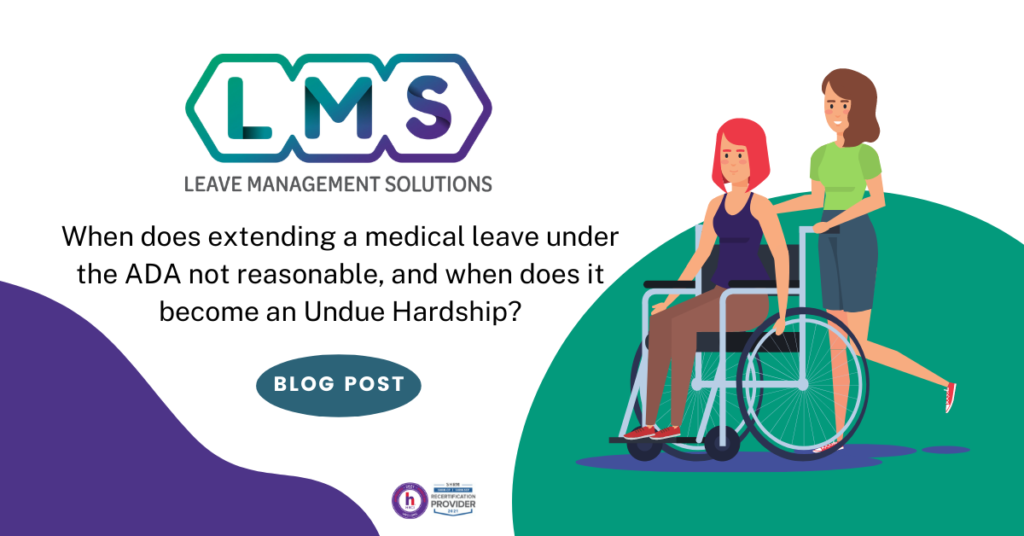Premium Content
Get Instant Access!
Enter your information to the right to unlock this premium content and get instant access to important answers to your HR questions!
Question:
May has an employee who keeps extending their medical leave and wants to know at what point can her company decide that the constant extensions are considered unreasonable or are becoming an Undue Hardship for the company? When this type of leave occurs, what alternatives does the company have in terms of ADA Accommodations?
Answer:
The ADA is a job protection benefit for Qualified Individuals with a Disability (QID) if the requested accommodation will facilitate the employee performing the essential functions of their job (or any job they are qualified for that is currently available) at a “meets expectations” level. ADA is an “ability to perform the essential functions of their job” benefit not a “leave” benefit. QID employees, who can demonstrate an ability to perform the essential job functions with the accommodation without an unreasonable accommodation request or an accommodation that is confirmed to be Undue Hardship to the employer, will be eligible for ADA accommodations. If an employee continues to request a new leave accommodation every time the current approved leave accommodation expires, instead of returning to work and performing the essential job functions, the accommodation was ineffective. So why should the company provide another leave accommodation if the first leave accommodation was ineffective and did not allow the employee to return to work? That is the issue, it becomes a question of efficacy and unpredictability of the requested accommodation. Explain this to the employee repetitively, the accommodation must facilitate the employee performing their essential job functions.
If the original accommodation request for leave expires and the employee does not return to work but requests another leave accommodation, don’t cut corners, complete the full Good Faith Interactive meeting process for the purpose of reviewing with the employee their requested accommodation. Require the employee to provide a fully completed Essential Function Job Analysis ADA Accommodation Certification, do not accept a generic Work Release with no information but a new return to work date. Every Accommodation is considered a new request, it is not an extension of an existing leave, that is a Workers’ Compensation and FMLA approach and will reduce the seriousness of the request for the employee and potentially confuse the employee into thinking they can easily extend their ADA leave as they did with FMLA. This is ADA! During this meeting take the time to explain that unpredictable, unreliable attendance is not a reasonable accommodation because it leaves the question open as to when the employee will be able to return to work and perform their essential job functions.
I would explain this the first time the employee requests leave as an accommodation or even during the FMLA process if I suspect the leave will go beyond 12 weeks. I would provide the employee an extension the first time they ask for a leave accommodation and explain in detail, again, how continued extensions will not be accommodated, and it is imperative the employee review with the medical provider the need to provide their best estimate of how long they employees needs to be off work as a result of their disability. This would include time to refer to new medical providers, time to schedule surgery, and time to recover from the surgery. Repeat this to the employee until they understand that unplanned extended leave that results in unpredictable attendance is an unreasonable accommodation request and could also be considered an Undue Hardship that cannot be accommodated.
Be consistent in the application of your standard operating procedure for requests for additional ADA accommodation leave. Will you allow for one additional leave accommodation request, two, three? Be Consistent!
When dealing with repetitive requests for an accommodation that includes continuing to request additional leave, the length of time for the leave should not matter, it is the repetitive, unpredictable attendance of the repetitive leave accommodation request that causes the Undue Hardship, not the length of the leave itself. However, the length of the leave as an accommodation itself, the first time, could be unreasonable and an Undue Hardship simply because of the length of the leave, the type of work the employee performed, and the impact to the organization if the employee is not able to complete the essential functions of their job, but that would be another discussion for a later date. Be Safe!
Some leaves of absence stretch on and on, leaving HR wondering whether leaves granted under the Americans with Disabilities Act (ADA) can be considered unreasonable and cause an employer an undue hardship.
Employers should be prepared if an ADA leave extension causes an undue hardship.
Do you know when the ADA allows you to stop granting leave extensions? If not, we’ve got just the thing for you.
LMS offers an on-demand ADA Accommodation Compliance course that will answer all of the questions you have regarding the Americans with Disabilities Act. If you already have a handle on the basics, you’re invited to join us for our upcoming advanced workshop.
Learn from an HR expert, Beth De Lima, MBA, SPHR-CA, SHRM-SCP, who has over 28+ years of complex medical leave/accommodation management experience and related expert testimony under her belt. This provides her a unique insight into the critical procedural errors that result in lawsuits you can’t win. If you’re interested in learning what you don’t know you’re invited to join us for our upcoming advanced workshop.


